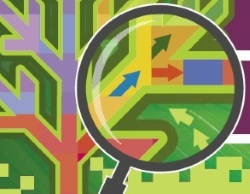 |
Groundbreaking Research
Table containing a variety of scientific studies approved by KKL-JNF to be carried out from one to three years.
The studies, undertaken by KKL-JNF scientists in collaboration with leading academic institutions and research institutes, concern the environment, climate change, water, renewable energy and ornithology.
|
|
|
|
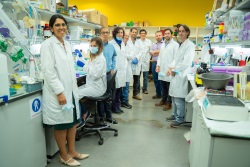 |
MIGAL Galilee Research Institute - COVID-19 Vaccine Development
(#17611)
KKL-JNF is supporting the MIGAL Galilee Research Institute in developing a COVID-19 oral vaccine that hopefully will soon be ready for in-vivo testing. |
|
|
|
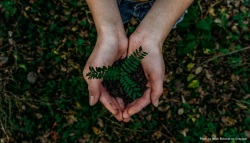 |
Israel's Generation Z Has Solutions
for the Developing World
(#17622)
KKL-JNF is a partner in the ISDG
Program, an Israeli, nationwide
high school competition to
create projects that address one
or more of the UN 17 Sustainable
Development Goals (SDGs) for
developing countries.
Project proposals, submitted by
hundreds of Israeli 7th through
12th graders, will be chosen
according to their innovation,
feasibility, and optimal use of
time and funding resources. The
three winning teams will be
flown to Rome, Italy to present
their projects before a forum of
a UN agency. ISDG promotes
innovation and entrepreneurship
among Israeli youth by
positioning them at the
forefront of the challenge to
address the developing world's
most pressing environmental,
social, and economic needs and
meet the UN goals for a
sustainable future by the year
2030. ISDG, a joint effort
between KKL-JNF and the Israel
Ministry of Foreign Affairs and
the Ministry of Education,
provides an empowering
experience for young people,
preparing the scientists,
conservationists, researchers,
legislators, and policy makers
of the future. Today's youth will define the environmental policies of the next decade. |
|
|
|
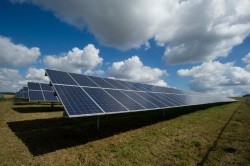 |
Renewable Energy – Strategic Plan in Cooperation with the Heschel Center for Sustainability
(#16958)
KKL-JNF's joint initiative with the Heschel Center for Sustainability involves the development of a localized economic model for the production of renewable energy to be tested in Israel's regional councils. The project includes relevant mappings, feasibility studies and testing various models to transform built-up areas (residential, commercial and industrial) into those solar generated by placing photovoltaic (PV) panels throughout chosen areas. The joint project's deliverable will be an economic, engineering and social model that will enable the feasibility of various alternatives to be calculated, which will determine development prioritization within a respective local authority. |
|
|
|
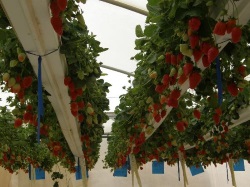 |
Ramat Negev R&D Station – Research
(#15768)
The Center for Experimental Desert Agriculture at Ramat Negev is part of the Ramat Negev Research and Development (R&D) Station since 1981. Its aim is to develop farming, irrigation, fertilization and cultivation methods suited to the unique environmental conditions in the region. The center promotes surveys and theoretical and empirical studies in the region that focus on farming with brackish water, finding qualitative and organoleptic (related to taste and smell) advantages, developing new crop strains in the region, improving crop quality, making the best use of the water available to the farmer and improving the economic viability of farms. The R&D station is also involved with developing marine agriculture in the region.
| Tell us what interests you in the field of research, and we'll try to find a project to match. |
|
|
|
|
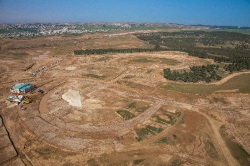
|
National Land Policy Studies Program at Tel Aviv University
(#14669)
KKL-JNF and Tel Aviv University cooperated in developing a program in national land policy as part of the Department of Geography and Human Environment's graduate studies. Through the program, the practical expertise and knowledge developed by KKL-JNF will enrich diverse academic disciplines and fields of research. |
|
|
|
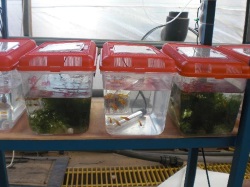 |
Central & Northern Arava R&D Station – Research
(#14208)
The Central and Northern Arava Research and Development (R&D) Station was established in 1986 to fulfill the development needs of the communities along Israel’s borders in the Negev and Arava. The station is active in the Central and Northern Arava and Tamar regional councils. Like other such centers in Israel the station is involved in finding solutions for the issues characteristic of farming in the area as well as in long-term development of production technologies and the introduction of new products, making the most of the specific advantages of the region. The agricultural products of the Arava make up 60% of Israel’s fresh produce exports and 15% of its cut flower exports.
| Tell us what interests you in the field of research, and we'll try to find a project to match. |
|
|
|
|
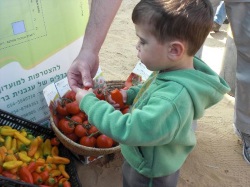 |
Besor R&D Station – Research
(#13904)
The Besor R&D, established in 1977, was the first of its kind in Israel. Like other agricultural R&D's, the facility is involved in finding solutions to the challenges of farming in the Negev desert, the long-term development of farming technologies, and the introduction of new produce.
| Tell us what interests you in the field of research, and we'll try to find a project to match. |
|
|
|
|
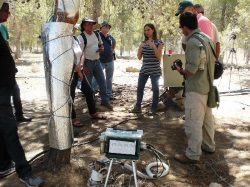
|
KKL-JNF Research to Promote Forest Ecosystem Services
(#12441)
The KKL-JNF Forestry Department's new forestry management policy promotes the vision of sustainable open spaces. Forest management recommendations are updated according to findings and predictions obtained from the results of diverse studies carried out in planted forests, natural woodlands, forest grazing areas, and sites visited and enjoyed by people. Climate change is a factor in management evaluation, ensuring the viability of the country's forests. Protecting forests from drought and pests requires selecting resistant varieties and introducing natural enemies against pests.
|
|
|
|
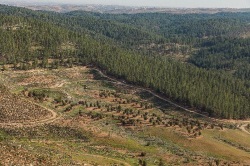
|
Assessing tree vitality and sensitivity to growing conditions in semi-arid pine forest using remote sensing techniques at the leaf to ecosystem scales" (Yatir Forest).
(Under Project 12441)
Principle research scientist: Prof. Dan Yakir of Earth and Planetary Sciences, Weizmann Institute of Science.
|
|
|
|
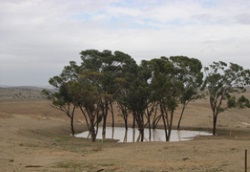
|
Upgrading the LTER research at Park Sayeret Shaked
(Under Project 12441),
addressing the challenges of
climate change and its
implications for KKL-JNF
operations in the Northern
Negev.
Principal researcher scientist:
Principal researcher scientist:
Prof. Moshe Shachak, The
Jacob Blaustein Institutes for
Desert Research, Newman
Information Center for Desert
R&D, Ben-Gurion
University of the Negev |
|
|
|
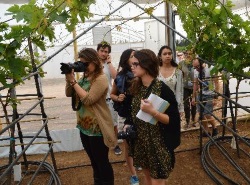 |
Emek Hamaayanot R&D Station - Research
(#7927)
Regional Research and Development (R&D) institutes were established in order to promote agricultural development and create means of production, which are essential to the existence of peripheral communities. The Emek HaMaayanot R&D Station is one of eight in Israel, supported by KKL-JNF, for the benefit of farmers in Israel. Studies focus on field crops, basil, dates, hothouse cooling, fish farming and weevils.
| Tell us what interests you in the field of research, and we'll try to find a project to match. |
|
|
|
|
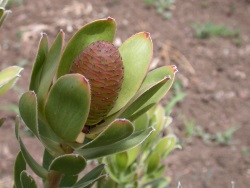 |
Northern R&D Station - Research
(#7926)
The Northern R&D serves as the research and development unit for agricultural production in the northern region, and its main activities are in crop cultivation. Research objectives involve increasing the range of crops, species and varieties, and their adaptation to local and foreign markets; developing environmentally friendly agriculture; developing precision agriculture technologies; and providing the farmers of the Galilee with solutions to problems in cultivating the region's crops.
| Tell us what interests you in the field of research, and we'll try to find a project to match. |
|
|
|
|
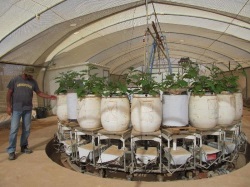 |
Southern Arava R&D Station - Research
(#7380)
Regional Research and Development (R&D) institutes were established in order to promote agricultural development and create means of production, which are essential to the existence of peripheral communities. The Southern Arava R&D Station is one of eight in Israel, four of which are in the Negev, supported by KKL-JNF for the benefit of farmers in the Negev. It focuses on developing new strains of vegetables, flowers and dates and new food sources to improve food security, as well as on developing sources of renewable energy from agricultural waste.
| Tell us what interests you in the field of research, and we'll try to find a project to match. |
|
|
|
|
|
|
|
|














